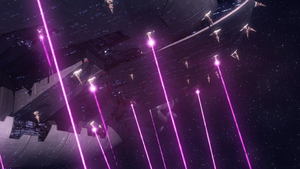Pulse laser turret: Difference between revisions
From Halopedia, the Halo wiki
m (Text replacement - "<ref name="([^"=>]+)" ?\/>" to "{{Ref/Reuse|$1}}") |
(→Damage) Tag: Mobile edit |
||
| Line 13: | Line 13: | ||
===Damage=== | ===Damage=== | ||
Like most Covenant weapons, the pulse laser turrets are rated in the kilowatt range.<ref>'''Halo: Contact Harvest''', ''page 27''</ref> Damages dealt by the pulse laser turrets are known to be serious threats to most, if not all UNSC ships; a pulse laser salvo is capable of melting through | Like most Covenant weapons, the pulse laser turrets are rated in the kilowatt range.<ref>'''Halo: Contact Harvest''', ''page 27''</ref> Damages dealt by the pulse laser turrets are known to be serious threats to most, if not all UNSC ships; a pulse laser salvo is capable of melting through Paris-class frigate Commonwealth’s 60 cm of [[Titanium-A armor]] hull in a single shot.<ref name="melt">'''Halo: The Fall of Reach''', '' chapter 12''</ref> In one such instance, the {{UNSCShip|Commonwealth}}, a [[UNSC frigate|frigate]], received severe armor damage in sections three and four to a quarter the original width.{{Ref/Reuse|melt}} As such, it is believed that UNSC ships with thicker armor would have to take multiple pulse laser salvos to show the same results. | ||
==Known types== | ==Known types== | ||
Revision as of 04:22, May 17, 2021

The pulse laser turret is a light Covenant ship-to-ship weapon system. These laser weapons are known to have been mounted on most Covenant ships and starfighters, and are mostly used for point defense but also for ship-to-ship combat.
Design details
Specifications
The pulse laser turret is one of the Covenant's primary weapon systems, often classified as a point-defense weapon and compared to the UNSC's point-defense guns. These pulse weapons are affixed to most Covenant ships, including Kig-Yar privateer ships such as the Minor Transgression, and starfighters such as the Type-31 "Seraph"-class. Covenant pulse lasers are typically considered to their UNSC counterparts, due to the Covenant's superior power storage systems and gravitic-lensing focal arrays.[1]
Firing operation
- Main article: Laser
The pulse laser turret fires by means of laser, using hydrogen fluoride as fuel.[2] Before the weapon fires, it must first charge; during the charge, a sphere of light energy forms around the charging weapon. After finishing charging, the weapon expels a cyan/purple beam of energy. A section of the ship's shielding system must be dropped to allow the pulse weapons to fire completely.[3]
Damage
Like most Covenant weapons, the pulse laser turrets are rated in the kilowatt range.[4] Damages dealt by the pulse laser turrets are known to be serious threats to most, if not all UNSC ships; a pulse laser salvo is capable of melting through Paris-class frigate Commonwealth’s 60 cm of Titanium-A armor hull in a single shot.[5] In one such instance, the UNSC Commonwealth, a frigate, received severe armor damage in sections three and four to a quarter the original width.[5] As such, it is believed that UNSC ships with thicker armor would have to take multiple pulse laser salvos to show the same results.
Known types
- Eriu-pattern - Used on the Hekar Taa-pattern Blockade Runner.
- Ferriel-pattern - Used on the Kerel-pattern CAS-class assault carrier.
- Gon-pattern - Used on the Sinaris-pattern CPV-class heavy destroyer and the Ket-pattern CCS-class battlecruisers.
- Pallio-pattern - Used on the Mjern-pattern DSC-class support ship.
- Phot-pattern - Used on the SDV-class heavy corvette.
- Phot Et-pattern - Used on the Varric-pattern ORS-class heavy cruiser, and the Mutan Et-pattern DAS-class storm cutter.
- Pok-pattern - Used on the CRS-class light cruiser.
Gallery
A CCS-class battlecruiser firing its ventral pulse laser turrets and dorsal plasma turrets.
An SDV-class heavy corvette fires a pulse laser at a space elevator at the Corbulo Academy, triggering its collapse.
List of appearances
- Halo: The Fall of Reach (First appearance)
- Halo: Ghosts of Onyx
- Halo: Contact Harvest
- Halo: Legends
- Halo 4: Forward Unto Dawn
- Halo: Mortal Dictata (Mentioned only)
- Halo 2: Anniversary
- Halo: Shadow of Intent
- Halo: Retribution
- Halo: Silent Storm (Mentioned only)
- Halo: Oblivion
Sources
- ^ Halo: Warfleet, Glossary - p.91
- ^ Halo: Contact Harvest, page 163
- ^ Halo: The Fall of Reach, page ??
- ^ Halo: Contact Harvest, page 27
- ^ a b Halo: The Fall of Reach, chapter 12




